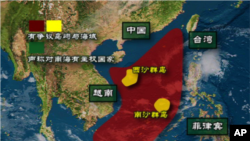中国业已成为亚太地区政治博弈中的一个主要力量。比如,通过在东南亚推动“低质量”的自由贸易协议,中国已经成功地把美国部分排除在东南亚贸易框架之外。中国还把东盟区域论坛和东亚峰会当作方便的、没有约束力的、和所谓“求同存异”的舞台,以避免谈论诸如南中国海主权争端等棘手问题。奥巴马政府近来大谈“亚洲重心”,使美国重新进入亚太地区的政治博弈,其中最明显的一点就是通过泛太平洋伙伴关系来达成多边自由贸易协议。那末,美国重返亚洲正在如何改变亚太地缘政治游戏中的现存成分?美国正在策划和实施哪些贸易和战略动议?日本、印度等其他区域大国将对美国和中国的动作做出何种反应?
敬请收看伍德罗•威尔逊国际学者中心举行的研讨会,由早稻田大学国际政治经济教授寺田贵博士解说亚太地区地缘政治博弈的新动向:南中国海主权争端和泛太平洋伙伴关系。
实况转播将从北京时间2012年3月28日星期三凌晨4点开始。
华盛顿时间:2012年3月27日星期二 下午4点-5点15分
北京时间:2012年3月28日星期三 凌晨4点-5点15分
伍德罗•威尔逊国际学者中心
***
Game Change in the Asia-Pacific: The South China Sea and TPP
March 27, 2012 // 4:00pm ─ 5:15pm
Woodrow Wilson International Center for Scholars:
Asia Program
Program on America and the Global Economy
Kissinger Institute on China and the United States
China has recently been a major force in political games in the Asia-Pacific. For example, it has succeeded in partly disengaging the United States from the trade framework in Southeast Asia by promoting ǒlow qualityō Free Trade Agreements in the region. China has also viewed the ASEAN Regional Forum and East Asia Summit as convenient non-binding and consensus-based arenas that allow Beijing to avoid dealing with hard issues such as maritime disputes in the South China Sea. The Obama administration’s much-discussed ǒAsia Pivotō is an attempt to reinsert the United States into regional political games and is perhaps most evident in the administration’s focus on the Trans-Pacific Partnership multilateral FTA. How is the United States’ reemergence as a regional player changing the existing components of the political game? What trade and strategic initiatives is Washington undertaking? How will other regional players, such as Japan and India, respond to American and Chinese moves?
Location: 5th Floor, Woodrow Wilson Center
Event Speakers List:
Takashi Terada
Public Policy Scholar
Professor of International Political Economy, Waseda University
Takashi Terada (寺田贵) is Professor of International Relations at Organization for Asian Studies, Waseda University. He received his Ph.D from Australian National University in 1999. Before taking up the current position in April 2008, he was an assistant professor at National University of Singapore (1999-2006) and associate professor at Waseda University (2006-2008). His most recent works (written in English) include ‘The Origins of ASEAN+6 and Japan’s Initiatives: China’s Rise and the Agent-Structure Analysis’, The Pacific Review, 23(1) 2010, ‘Singapore and ASEAN’s Competitive Regionalism in Southeast Asia and beyond’ in M. Solis, S. Katada and B. Stallings (eds.) Competitive Regionalism: Explaining the Diffusion and Implications of FTAs in the World Economy (Palgrave 2009), ‘Japan and Evolution of Asian Regionalism: Responsible for Three Normative Transformations’ in Dieter, Heribert (ed.) The Evolution of Asian Regionalism: Economic and Security Issues (Routledge 2008), and Critical Perspectives in World Economy: Asia Pacific Economic Cooperation, 5 Volumes, (Routledge 2007), co-edited with Peter Drysdale. He is the recipient of the 2005 J.G. Crawford Award.















